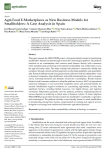Garcia-Gallego J.M., Chamorro-Mera A., Valero-Amaro V., Martinez-Jimenez M., Romero P., Miranda M.T., Rubio S. (2025). Agri-food e-marketplaces as new business models for smallholders: a case analysis in Spain. Agriculture, 01/09/2025, vol. 15, n. 17, p. 1806.
https://doi.org/10.3390/agriculture15171806
https://doi.org/10.3390/agriculture15171806
| Titre : | Agri-food e-marketplaces as new business models for smallholders: a case analysis in Spain (2025) |
| Auteurs : | J.M. Garcia-Gallego ; A. Chamorro-Mera ; V. Valero-Amaro ; M. Martinez-Jimenez ; P. Romero ; M.T. Miranda ; S. Rubio |
| Type de document : | Article |
| Dans : | Agriculture (vol. 15, n. 17, September 2025) |
| Article en page(s) : | p. 1806 |
| Langues : | Anglais |
| Langues du résumé : | Anglais |
| Catégories : |
Catégories principales 11 - COMMERCE ; 11.2 - Commercialisation. DistributionThésaurus IAMM COMMERCE AGRICOLE ; COMMERCE ELECTRONIQUE ; PETITE EXPLOITATION AGRICOLE ; ESPAGNE |
| Résumé : | This paper presents the SMALLDERS project, a European initiative aimed at transforming smallholders' business models through an innovative technological platform. The platform functions as an e-marketplace that connects small farmers directly with consumers while simultaneously promoting environmental sustainability and collaboration across the agri-food value chain. The study evaluates the platform's commercial viability and acceptance through a mixed-methods approach, incorporating qualitative and quantitative data. Research methods include focus group sessions, interviews with key stakeholders-such as transport companies, large distributors, and public administrations-and a consumer survey assessing intentions and attitudes toward the e-marketplace. Results indicate limited overall consumer readiness to adopt the platform; however, 48.6% of respondents expressed willingness to use it provided competitive prices and personal benefits are assured. Smallholders regard e-commerce as a promising opportunity, yet they face significant barriers, including limited resources, low digital literacy, and logistical constraints. Stakeholders generally view the platform positively, emphasizing that its success depends on achieving a critical mass of business volume. To foster adoption, SMALLDERS proposes three business models for smallholders: sustainable, cooperative, and technological. The platform includes a user-friendly feature to assist smallholders in transitioning among these models, complemented by training and support services designed to encourage more resilient and innovative agricultural practices. |
| Cote : | En ligne |
| URL / DOI : | https://doi.org/10.3390/agriculture15171806 |







